
17 – 19 June 2024
The 8th Black Sea Cybersecurity Conference
Constanta, Romania
Cyber ETEE Conference

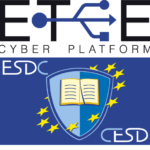
The 8th Black Sea Cybersecurity Conference is organised by the Maritime Cybersecurity Centre of Excellence of the Constanta Maritime University under the aegis of the European Security and Defence College
Cybersecurity Synergies in a Digitalised World
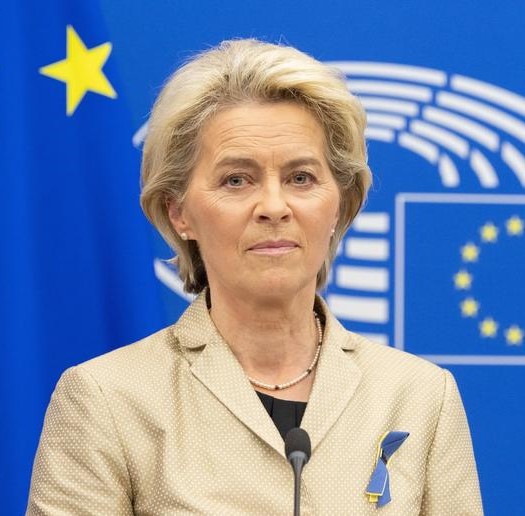
“[…] Europe can – and clearly should – be able and willing to do more on its own. But if we are to do more, we first need to explain why. I see three broad categories. First, we need to provide stability in our neighbourhood and across different regions. We are connected to the world by narrow straits, stormy seas and vast land borders. Because of that geography, Europe knows better than anyone that if you don’t deal in time with the crisis abroad, the crisis comes to you. Secondly, the nature of the threats we face is evolving rapidly: from hybrid or cyber-attacks to the growing arms race in space.”
Ursula von der Leyen
European Commission President
Excellence in Cybersecurity
About the Event
The Black Sea Cybersecurity Conference, now in its 8th edition, is a premier gathering of the brightest minds in the domain of cybersecurity. Hosted at the Maritime Cybersecurity Centre of Excellence (MARCYSCOE) of the Maritime University of Constanta, the conference is a melting pot of experts, policymakers, industry leaders, academics, and cyber enthusiasts. The aim is to explore the intertwining realm of cybersecurity, drawing inspiration from ever-changing events and developments in the cyber world. In a world dominated by digital integration, the 2024 theme, “Cybersecurity Synergies in a Digitalised World,” underscores the critical need to create and nurture synergies in cybersecurity.
As the digital world continues to expand and integrate into every facet of our lives, understanding these synergies becomes paramount. No longer can sectors of cybersecurity operate in silos; the challenges faced are universal, transcending borders and sectors. This necessitates a collaborative approach where knowledge, tools, and strategies are shared, merged, and optimised. Synergies ensure that there is a seamless flow of information, rapid response mechanisms, and a cohesive strategy in place. A synergised approach ensures that responses to threats are unified and coordinated among the public and private sectors, defence and civilian spheres, various industries, academia, and the whole society.
Purpose
One of the primary advantages of fostering synergies is the pooling of resources and expertise. Therefore, the primary objective of the conference is to foster collaboration, disseminate pioneering research, and bolster readiness for the looming challenges of a digital Europe. This is achieved by facilitating a broad mix of professionals and organisations from academia, governmental bodies, including the defence, and private sectors. The conference underscores the interdependence, shared challenges, and mutual benefits of collaborative efforts in cybersecurity.
Rationale
In an era where cybersecurity is paramount, the Black Sea Cybersecurity Conference serves as a beacon, guiding the collective wisdom of its participants. By bringing together thought leaders, industry experts, and stakeholders, the conference seeks to pave the way for a synergic cyber world, integrating E.U. and NATO overarching goals in the cybersecurity realm. With this initiative, the Maritime University of Constanta reiterates its unwavering commitment to a unified, resilient, and secure digital future.
Objectives of the Conference
- Facilitate the sharing and discussion of best practices, recent developments, and challenges in cybersecurity.
- Drive a harmonised European approach to cybersecurity, respecting shared and unique national concerns.
- Emphasise an integrated European strategy focusing on resilience across digital infrastructure.
- Showcase cybersecurity solutions to bolster Europe’s defence against cyber threats.
- Broaden the network of cyber professionals across Europe, fostering unity and shared purpose.
- Gather feedback on presented initiatives and strategies, refining future activities.
Post-Conference Benefits
- A comprehensive document detailing the conference’s presentations, discussions, and findings.
- Surveys to share experiences and insights, shaping future conference agendas.
- Stay up-to-date with with the latest news and developments from EU cybersecurity policies and initiatives and connect them to the global cybersecurity endeavour.
- Attendees will have access to a digital platform that facilitates continued networking post-conference. This platform will allow participants to connect with peers, experts, and industry leaders, fostering potential collaborations, joint ventures, and knowledge exchange, ensuring that the relationships built during the conference have a lasting impact.
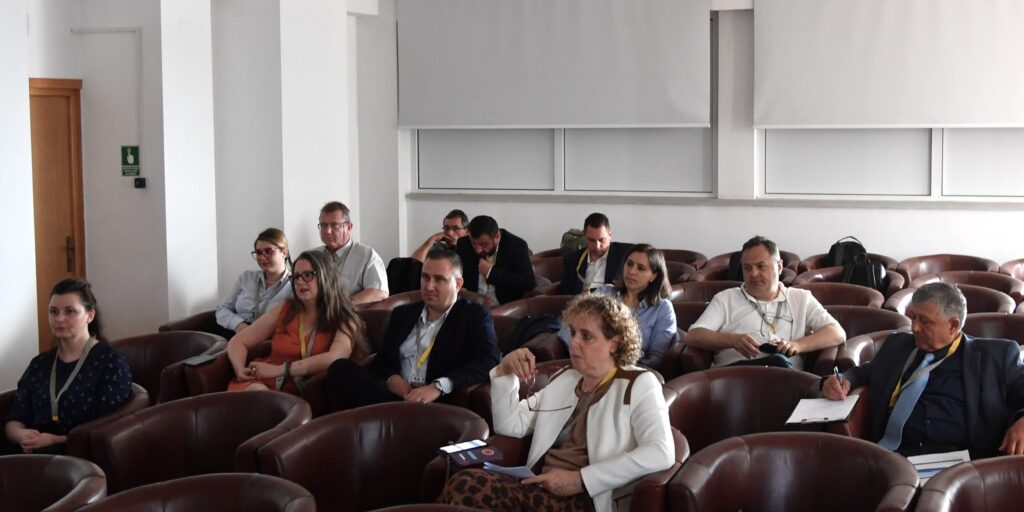
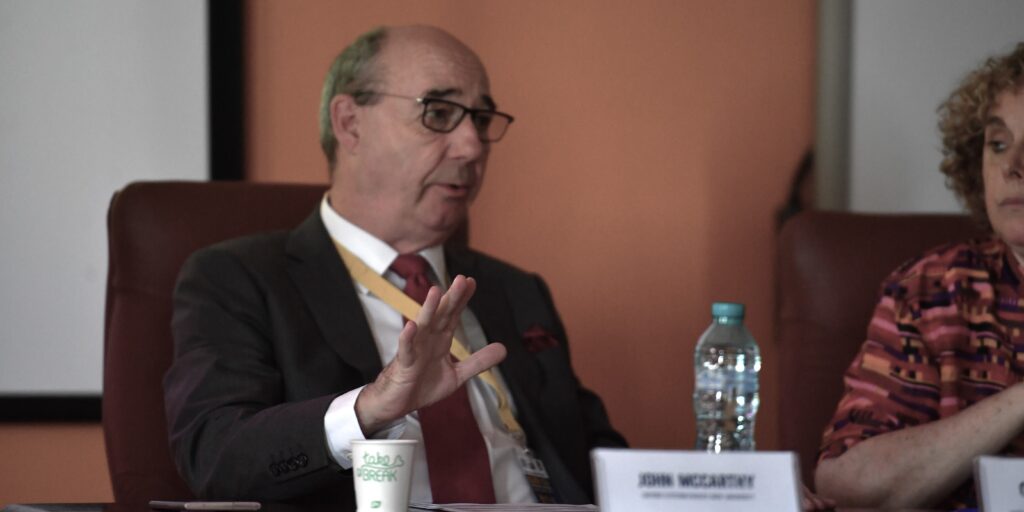
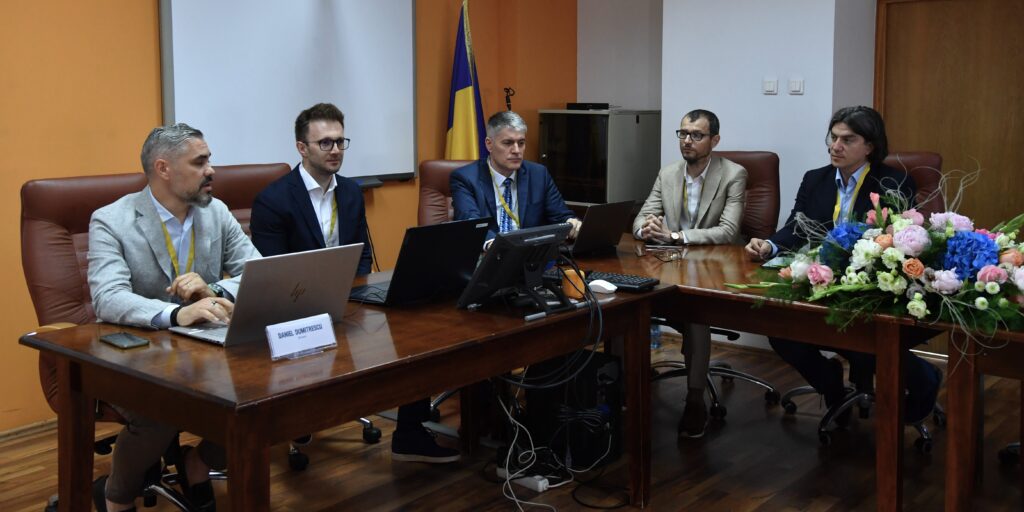
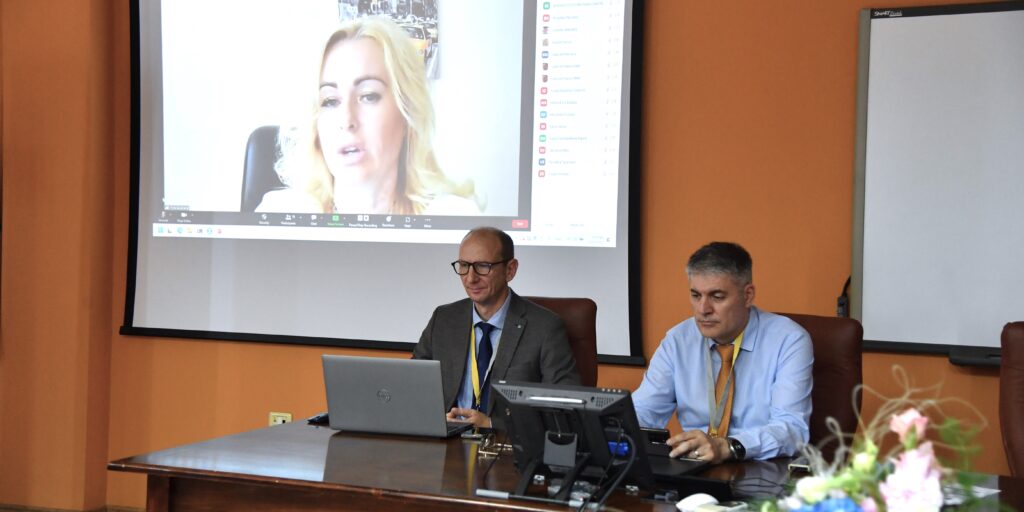
Panels
Opening Panel: The Digital Landscape – Opportunities and Threats
This panel seeks to provide a comprehensive overview of the current digital geopolitical environment, diving into the nuances of contemporary challenges and the potential avenues for innovation, collaboration, and growth.
Coupled with nation-state actors leveraging cyber tactics as extensions of political strategy, the complexities of cybersecurity have transcended technical challenges, becoming integral components of global diplomacy and international relations. The panel will discuss the implications of these intertwined trends, examining the latest threat vectors, the sophistication of cyber adversaries, and the increasing frequency of high-profile breaches with potential geopolitical ramifications.
Parallel to these challenges, the digital transformation also heralds a multitude of opportunities—advancements in artificial intelligence, machine learning, and quantum computing promise to revolutionise cybersecurity strategies. Yet, the emergence of collaborative platforms, international alliances, and national initiatives aimed at sharing threat intelligence, best practices, and resources underscore the importance of a united, global response to cyber threats. The panel will emphasise the shared responsibility of nations to act against cyber threats, acknowledging the critical role of international cooperation in ensuring collective digital security.
Moreover, the session will touch upon the regulatory landscape, discussing the implications of policies like GDPR and how they shape cybersecurity strategies while protecting user privacy. The panel will delve into the balance between fostering innovation, ensuring security, and upholding national and international responsibilities in the broader context of the global digital economy and geopolitics. They will highlight the challenges and opportunities presented by the intricate dance of diplomacy, defence, and digital transformation.
Thus, this panel promises to be a holistic exploration of the digital and geopolitical landscape, dissecting the myriad challenges and opportunities it presents. Attendees can expect to gain deep insights into the forefront of cybersecurity trends, the evolving nature of technical and geopolitical threats, and the collaborative strategies crucial for safeguarding our interconnected world.
Panel 1: The Role of Public-Private Partnerships in Cybersecurity
This panel seeks to elucidate the critical role cybersecurity public-private partnerships play, assessing their significance in bolstering the collective defence against an ever-evolving cyber threat landscape.
In today’s cybersecurity landscape, public-private partnerships (PPPs) have emerged as a linchpin, bridging the gap between governmental mandates and the dynamism of the private sector.
Governments, with their regulatory powers, national security concerns, and policy-making capabilities, have a unique vantage point on the macro-level challenges of cybersecurity. Yet, it’s often the private sector – tech giants, startups, and everything in between – that drives technological innovation understanding the granular intricacies of the digital realm. The fusion of these two worlds through PPPs offers an unparalleled synergy, ensuring that policies meet practice and that innovation aligns with national security objectives.
The panel will explore successful examples of PPPs across the Euro-Atlantic region, highlighting the mutual benefits added. From threat intelligence sharing and joint research initiatives to the development and implementation of cutting-edge cybersecurity solutions, these partnerships have proven instrumental in pre-empting, detecting, and mitigating cyber threats.
However, the journey is not without challenges. The panel will discuss potential pitfalls, including concerns over data privacy, intellectual property rights, and potential conflicts of interest. In a world where cyber threats can originate from state actors, non-state entities, or individuals, striking the right balance in a PPP can be intricate. The discussion will also touch upon the responsibilities of each party, emphasising the need for transparency, trust, and a shared vision.
Furthermore, in the context of geopolitical dynamics, the panel will explore how PPPs can be leveraged to foster international collaborations, transcending borders to create a unified front against common cyber adversaries. In an era where cyber threats often have global implications, international public-private collaborations can serve as a beacon of hope and a model for collective action.
This panel promises an in-depth exploration of the multifaceted world of public-private partnerships in cybersecurity. Attendees will gain insights into the successes and challenges of PPPs, understanding their pivotal role in shaping a resilient, secure, and innovative digital future.
Panel 2: Bridging the Gap – Civilian and Defence Cybersecurity EU Synergies
This panel sets out to dissect civilian and defence cybersecurity convergence, spotlighting the synergies between these two traditionally distinct realms and the paramount importance of their harmonized collaboration.
In the intricate tapestry of global cybersecurity, the convergence of civilian and defence sectors has emerged as a focal point of discussion, emphasising the intertwined nature of their challenges and solutions.
The civilian and defence sectors, while operating with different primary objectives, find themselves facing many shared threats in the digital domain. From critical infrastructure attacks that cripple a nation’s utilities to sophisticated espionage campaigns targeting corporate secrets and state intelligence, the lines between ‘civilian’ and ‘defence’ cyber threats have become increasingly blurred.
The panel will delve into how this convergence is reshaping the cybersecurity landscape. It will highlight cases where collaboration between these sectors has led to identifying, mitigating, and preventing significant cyber threats. Such partnerships not only leverage the technical expertise of the private sector but also benefit from the defence sector’s intelligence capabilities and strategic perspectives.
Furthermore, the discussion will probe into the European implications of these synergies. How can EU member states collectively benefit from a harmonised civilian and defence cybersecurity approach? How might international collaborations pave the way for a more secure global digital ecosystem?
This panel promises a comprehensive exploration of the synergistic relationship between civilian and defence cybersecurity sectors. Attendees can anticipate a deep dive into this convergence’s challenges, successes, and future potential, gaining a holistic understanding of its critical role in safeguarding our digital world.
Panel 3: The EU’s Response to Evolving Cyber Threats in the Digital Era
This panel aims to offer a comprehensive exploration of the EU’s response mechanisms to the myriad of cyber threats in this digital age.
As we transition more profoundly into the digital era, cyber threats evolve in complexity, scale, and impact, presenting multifaceted challenges to individuals, corporations, and nations alike. Within this dynamic landscape, the European Union has emerged as a pivotal player, continually adapting and refining its strategies to safeguard its digital borders and citizens.
The discussion will embark on a strategic and analytical journey, charting the evolution of cyber threats that have targeted or affected the EU in recent years. From large-scale ransomware attacks that have crippled critical infrastructure to sophisticated espionage campaigns that seek to undermine democratic processes, the EU has witnessed an array of cyber challenges. The panel will dissect these incidents, shedding light on the modus operandi of adversaries and the broader geopolitical implications.
Central to the discourse will be the EU’s multifaceted response strategy. The panellists will discuss the European Cybersecurity Act, the establishment of the EU Cybersecurity Agency (ENISA), and other legislative and practical measures that have been instituted. The role of the NIS Directive in bolstering the cybersecurity of essential services will also be a focal point of discussion.
Moreover, the panel will highlight the EU’s efforts to foster member states’ collaboration. Through initiatives like the EU Cybersecurity Certification Framework, the union aims to harmonise cybersecurity standards across its member states, ensuring a consistent and high level of cybersecurity. The discussion will also touch upon the EU’s collaborations beyond its borders, emphasising partnerships, information sharing, and joint response mechanisms.
In addition to strategic responses, the panel will also explore the EU’s endeavours in the realms of research, innovation, and public awareness. How is the EU fostering a culture of cybersecurity among its citizens? How are public-private partnerships being leveraged to drive innovation in cybersecurity solutions?
Panel 4: Global Initiatives in Cybersecurity Education and Awareness
This panel investigates collective global efforts aimed at equipping individuals, organizations, and nations with the requisite knowledge and skills to navigate the cyber realm safely.
The digital world knows no borders, and neither do cyber threats. As cyber adversaries employ increasingly sophisticated and far-reaching tactics, international cyber incidents have become frequent headlines, affecting nations, industries, and individuals alike.
The panel will embark on a retrospective journey, revisiting some of the most impactful cyber incidents that have reverberated across international borders. From widespread ransomware attacks to more targeted cyber espionage campaigns, these incidents provide a wealth of knowledge about cyber adversaries’ tactics, techniques, procedures, and the vulnerabilities of global digital infrastructure. A core part of the discussion will be a deep dive into these incidents’ immediate and long-term ramifications. Beyond the immediate fallout –financial, operational, or reputational – such events often lead to shifts in national policies, international collaborations, and industry practices.
The discourse will also highlight the collaborative efforts that have emerged in the aftermath of significant cyber incidents. In addition to collaboration, the panel will also emphasise the importance of preparedness. Real-world case studies will be used to illustrate the significance of proactive measures, from robust cyber hygiene practices to comprehensive incident response plans. The panellists will discuss how lessons from past incidents have been translated into actionable strategies to prevent, detect, and respond to future threats.
Closing the session, the panel will offer a forward-looking perspective, discussing the evolving nature of cyber threats and the need for adaptive resilience strategies. With the digital realm becoming even more integrated, the potential for cross-border incidents only increases, underscoring the need for continuous learning and international cooperation. The insights and lessons shared will serve as invaluable tools for enhancing cyber resilience at both national and international levels, emphasising the shared stake and collective responsibility in safeguarding the global digital ecosystem.
Panel 5: Cyber Resilience Across Borders – Lessons from International Cyber Incidents
This panel aims to dissect notable international cyber incidents, extracting valuable lessons and insights to bolster global cyber resilience.
The digital world knows no borders, and neither do cyber threats. As cyber adversaries employ increasingly sophisticated and far-reaching tactics, international cyber incidents have become frequent headlines, affecting nations, industries, and individuals alike.
The panel will embark on a retrospective journey, revisiting some of the most impactful cyber incidents that have reverberated across international borders. From widespread ransomware attacks to more targeted cyber espionage campaigns, these incidents provide a wealth of knowledge about the tactics, techniques, and procedures of cyber adversaries and the vulnerabilities of global digital infrastructure. A core part of the discussion will be a deep dive into the immediate and long-term ramifications of these incidents. Beyond the immediate fallout – be it financial, operational, or reputational – such events often lead to shifts in national policies, international collaborations, and industry practices.
The discourse will also highlight the collaborative efforts that have emerged in the aftermath of major cyber incidents. In addition to collaboration, the panel will also emphasize the importance of preparedness. Real-world case studies will be used to illustrate the significance of proactive measures, from robust cyber hygiene practices to comprehensive incident response plans. The panellists will discuss how lessons from past incidents have been translated into actionable strategies to prevent, detect, and respond to future threats.
Closing the session, the panel will offer a forward-looking perspective, discussing the evolving nature of cyber threats and the need for adaptive resilience strategies. With the digital realm becoming even more integrated, the potential for cross-border incidents only increases, underscoring the need for continuous learning and international cooperation. The insights and lessons shared will serve as invaluable tools for enhancing cyber resilience at both national and international levels, emphasizing the shared stake and collective responsibility in safeguarding the global digital ecosystem.
Workshops
Workshop 1: Cultivating Cybersecurity Awareness & Culture in a Digital Age
This workshop offers a perspective on strategies and tools designed to embed cybersecurity consciousness within organisations and communities.his
In today’s rapidly evolving digital landscape, cultivating a robust culture of cybersecurity awareness is more critical than ever.
Objective:
This workshop is designed to highlight the paramount importance of cybersecurity awareness in the digital age and to equip participants with actionable strategies to foster a cybersecurity-centric mindset in various settings.
Structure & Content:
Introduction & Digital Context Setting
A brief presentation on the pervasive nature of digital technologies underscoring the increasing integration of these technologies into daily life and the associated rise in cyber vulnerabilities.
Group Activity: Unravelling Misconceptions
Participants will be grouped to identify and discuss prevalent misconceptions about cybersecurity. This activity seeks to spotlight the knowledge gaps and challenges in the general perception of cybersecurity.
Interactive Session: Demystifying Cybersecurity with Real-world Scenarios
Facilitators will present real-world case studies, emphasising the tangible consequences of cyber threats and the importance of being proactive rather than reactive.
Brainstorming: Strategies for Enhancing Awareness
Participants will collaboratively brainstorm on effective methods to promote cybersecurity awareness. This includes considering training modules, awareness campaigns, and leveraging influential platforms for outreach. Through role-play, participants will engage in simulated scenarios, allowing them to understand the practical implications of awareness and the roles different stakeholders play in incident response.
Concluding Remarks & Forward Path
The session will wrap up by reiterating the collective role in fostering a cybersecurity-aware culture. Attendees will be motivated to apply the workshop’s insights, acting as catalysts for change in their respective environments.
Workshop 2: Building Collaborative Cybersecurity Frameworks
This workshop is an interactive session explicitly tailored to the European context, facilitating the hands-on development of cooperative cybersecurity strategies that resonate with European values, regulations, and threats.
Amidst the complex tapestry of global cybersecurity, the European landscape presents its unique challenges and opportunities.
Objective:
This workshop aims to immerse participants in the intricacies of European cybersecurity, empowering them to collaboratively design frameworks that are attuned to the region’s specific needs, challenges, and aspirations.
Structure & Content:
Introduction & European Context Setting
Participants will be provided with a scenario regarding the European cybersecurity landscape, touching upon potential threats, key regulations like GDPR, landmark incidents, and regional collaboration initiatives like ENISA. This scenario-based approach will create a vivid backdrop, helping attendees understand the unique dynamics and urgencies of the European context.
Group Activity: Identifying European Challenges
Based on the provided scenario, participants will be grouped and prompted to discuss the specific challenges Europe faces in cybersecurity collaboration, from regulatory harmonisation to cross-border threat intelligence sharing.
Brainstorming: European-centric Solutions & Best Practices
Building on the previously identified challenges, groups will brainstorm solutions and best practices tailored to the European context, considering factors like EU policies, regional geopolitics, and shared digital infrastructure.
Sketching the European Framework
Drawing from the brainstorming insights, each group will outline a European collaborative cybersecurity framework. Facilitators, well-versed in European cybersecurity nuances, will assist, providing feedback and ensuring alignment with European standards and values.
Concluding Insights & European Way Forward
The session will wrap up with reflections on the importance of a unified European approach to cybersecurity, encouraging participants to champion and iterate upon the frameworks in their respective EU-based entities.
Closing Panel
Innovative dialogue exploring present-day cybersecurity challenges to forecast emerging threats. As we stand at the crossroads of technological innovation and its implications, it is paramount to examine today’s concerns to ensure a safer and more secure digital realm for tomorrow.
The cyber realm is continuously evolving, and with it arises a new set of challenges. These concerns, while daunting, are not insurmountable, especially when tackled collectively with the right set of knowledge, expertise, and foresight. Our discussion today is not just about identifying these challenges but also about charting a roadmap to address them proactively.
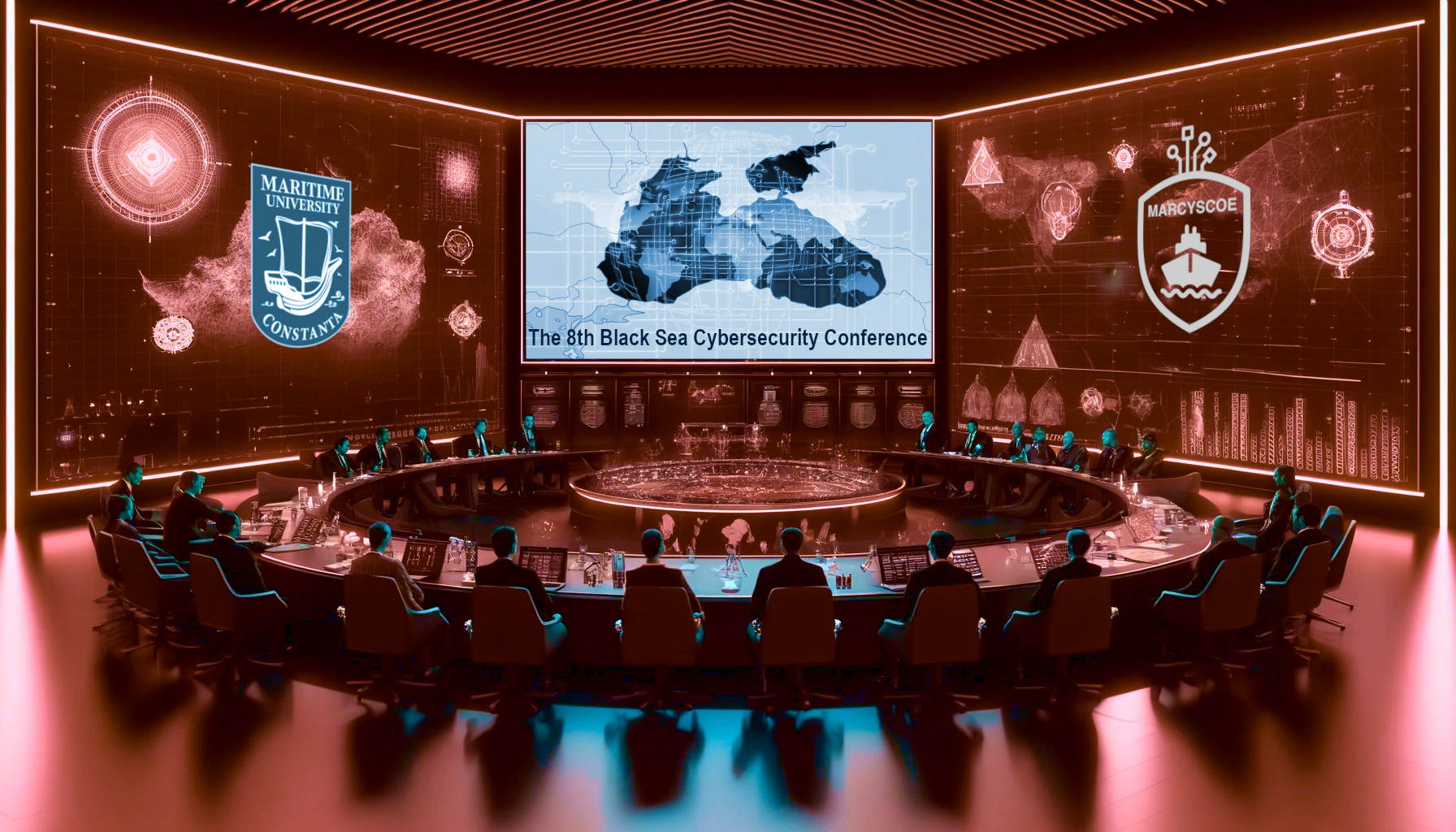
Event Schedule
Day 1
17 June 2024
08:30 - 09:00
Registration & Welcome Refreshments
09:00 - 09:15
Opening Remarks
Prof Gabriel Raicu, Rector, Constanta Maritime University
09:15 - 10:00
Opening Panel: The Digital Landscape - Opportunities and Threats
Chairperson:
Dr Niculae Iancu, Vice-President, MARCYSCOE
Panelists:
Ms. Dan Cimpean, The Director, National Cyber Security Directorate (DNSC) (TBC)
Prof. Gabriel Raicu, Rector, Constanta Maritime University & President, MARCYSCOE
Dr. Arnold Dupuy, Faculty Associate, Energy Academic Group, Naval Postgraduate School, USA
Mr. Emanuel Cernat, Managing Partner, Corporate Affairs Strategies
Mr. Adrian Liviu Arsene, Director of Threat Research and Reporting, CrowdStrike
10:00 - 10:15
Coffee Break
10:15 - 11:45
Panel 1: The Role of Public-Private Partnerships in Cybersecurity
Chairperson:
Dr. Daniel Dumitrescu, Chief Innovation Officer, InnovX
Panelists:
Mr. Jeroen Pijpker, Maritime IT Security, Maritime Institute Willem Barentsz NHL Stenden University of Applied Sciences
Mr. Alexandru Georgescu, Researcher, The National Institute for Research & Development in Informatics - ICI Bucharest
Mr. Bogdan Stefan, Managing Director Information Technology, EximBank
Mr. George Suciu, R&D and Innovation Manager, BEIA SRL (Belgium) (VTC)
11:45 - 12:00
Coffee Break
12:00 - 12:45
Keynote Address 1: Synergies in Cybersecurity
Speaker:
Dr. Niculae Iancu, VP, MARCYSCOE,
Project Co-Coordinator, "Strengthening Synergies in Defence and Civilian Cybersecurity" Project (ECYBRIDGE-DIGITAL-ECCC-2023-DEPLOY-CYBER-04)
12:45 - 13:45
Lunch Break
Technology Presentation Sessions 1
13:45 - 14:30
Session 1. Innovations in Defence Cybersecurity
Charlotte AI Technology
Mr. Marian Radu, Sr. Director Generative AI, CrowdStrike
14:30 - 15:15
Session 2. Emerging Tech in Private Cybersecurity
Host: Mr. Mircea Scheau, Cybersecurity Programme Manager, Integrated Intelligence, Defence and Security Solutions
HyperRing: Innovating the Root of Trust in Cybersecurity
Mr. Yoonil Choi, CTO, HyperRing
15:15 - 15:30
Coffee Break
15:30 - 17:00
Workshop 1: Cultivating Cybersecurity Awareness & Culture in a Digital Age
Dr. John McCarthy, CEO, Oxford Systems, UK
Day 2
18 June 2024
08:30 - 09:00
Morning Refreshments
09:00 - 10:30
Panel 2: Bridging the Gap - Civilian and Defence Cybersecurity Synergies
Chairperson:
Mr Horatiu Garban, Researcher, Cybersecurity Expert, CMU
Panelists:
CDR Joachim Richter, Action Officer CIS&CD Directorate, European Union Military Staff (EUMS), European External Action Service (EEAS) (VTC)
Ms. Gioia MARZANO, Cyber Policy Officer (SNE), European External Action Service (EEAS) (TBC)
Dr. Maria Constantinescu, Assistant Professor, Regional Department of Defense Resources Management Studies, Romania
Prof. Cristian Barna, Training Manager, Intelligence4ALL, Romania
Dimitar Dimitrov & Dimitar Nikolov, Nikola Vaptsarov Naval Academy, Bulgaria
10:30 - 10:45
Coffee Break
10:45 - 11:15
Keynote Address 2: EU's Cybersecurity Roadmap in
the Age of Digital Transformation
Speaker:
Dr. Velizar Shalamanov, Deputy Director of the Institute of Information and Communications Technologies, Former Minister of Defence, Bulgaria, Former Chairperson, NATO NCI Organisation
11:15 - 11:30
Coffee Break
11:30 - 13:00
Panel 3: The EU's Response to Evolving Cyber Threats in the Digital Era
Chairperson:
Mr. Radu Stanescu, Governing Board Member for Romania, European Cybersecurity Competence Centre
Panelists:
Mr. Luca Gargano, Project Officer for Maritime Security in Department Safety, Security and Surveillance, European Maritime Safety Agency (VTC)
Dr. Henning Jessen, Professor, World Maritime University
Mr. Bogdan Stefan, Managing Director Information Technology, EximBank
Mr. Alexandru Georgescu, Researcher, The National Institute for Research & Development in Informatics - ICI Bucharest
Mr. Daniele Catteddu, Chief Technology Officer, Cloud Security Alliance (VTC)
Elena Alina Gabar, Cloud Security Alliance, Romanian Chapter
13:00 - 14:00
Lunch Break
Technology Presentation Sessions 2
14:00 - 14:45
Session 1. Transforming Data Protection into Data Resilience
Dell Technology
Mr. Ionut Rosca, Data Protection Solutions Specialist, Dell Technologies Romania
14:45 - 15:30
Session 2. AI and Cybersecurity
Palo Alto Networks Technology
Mr. Costin Gheorghe, Core System Engineer, Palo Alto Networks
15:30 - 16:15
Session 3. Cybersecurity Innovation
Google Technology
Ms. Simona Botner, Customer Engineer Google Cloud - Public Sector
16:15 - 16:30
Coffee Break
16:30 - 18:00
Workshop 2: Building Collaborative Cybersecurity Frameworks
Prof. Gabriel Raicu, Rector, Constanta Maritime University & President, MARCYSCOE
Prof. Radu Hanzu, Vice-Rector, Constanta Maritime University
Dr. Vasile V. Draghici, President, ARECS & Member of the Board of Directors, Maritime Cybersecurity Centre of Excellence
Dr. Liviu Mihai Danila, Vice-President, ARECS & Member of the Board of Directors, Maritime Cybersecurity Centre of Excellence
Dr. Tal Pavel, Founder & Director, CyBureau
Dr. Saša Kos, Cyber Security Specialist, Ministry of Defence of Republic of Slovenia
Day 3
19 June 2024
08:30 - 09:00
Morning Refreshments
09:00 - 10:30
Panel 4: Global Initiatives in Cybersecurity Education and Awareness
Chairperson:
Dr. Alexandra Raicu, Head of Department, Constanta Maritime University
Panelists:
Ms. Octavia Lojnita, Founder, Vice President, Women4Cyber Romania
Dr. Cristina Dragomir, Associate Professor, Constanta Maritime University
Dr. Anastasia Duse, Professor, Constanta Maritime University
Dr. John McCarthy, CEO, Oxford Systems, UK
Prof. Remus Zagan, CMU Senate President, Constanta Maritime University
10:30 - 10:45
Coffee Break
10:45 - 11:15
Keynote Address 3: Estonian Perspective on the E.U. Cybersecurity Landscape
Speaker:
Research Prof. Sanja Bauk, Chair of the MariCybERA, The Estonian Maritime Academy
11:15 - 11:30
Coffee Break
11:30 - 13:00
Panel 5: Cyber Resilience Across Borders - Lessons from International Cyber Incidents
Chairperson:
Ms. Gabriela Matei, Cybersecurity Expert, The Euro-Atlantic Resilience Centre
Panelists:
Research Prof. Sanja Bauk, Chair of the MariCybERA, The Estonian Maritime Academy
Mr. Ionut Rosca, Data Protection Solutions Specialist, Dell Technologies Romania
Mr. Bogdan-Costel Irimia, Team Manager & Penetration Testing Technical Lead, Eviden
Dr. Horatiu Moga, Professor, Constanta Maritime University
Mr. Toma Cimpeanu, CEO, National Association for Information Systems Security (ANSSI) (VTC)
Mr. Charis Stengos, Mentor, InnovX
Mr. Razvan Ceuca, New Strategy Center
13:00 - 14:00
Lunch Break
14:00 - 15:30
Technology Presentation Sessions 3
14:00 - 14:45
Session 1. The Global State of Cyber Hygiene and Best Practices
GMB Computers Constanta
Mr. Paul Balan, Project Manager, GMB Computers
14:45 - 15:30
Session 2. Future Tech in Cybersecurity
Crucial Constanta
Mr. Catalin Anghel, Director, Crucial Systems & Services
15:30 - 16:45
Closing Panel: Cybersecurity as a Pillar of a Connected World
Prof. Gabriel Raicu, Rector, Constanta Maritime University
Dr. John McCarthy, CEO, Oxford Systems, UK
Ms. Gabriela Matei, Cybersecurity Expert, The Euro-Atlantic Resilience Centre
Prof. Remus Zagan, CMU Senate President, Constanta Maritime University
16:45 - 17:00
Closing Remarks and Acknowledgements
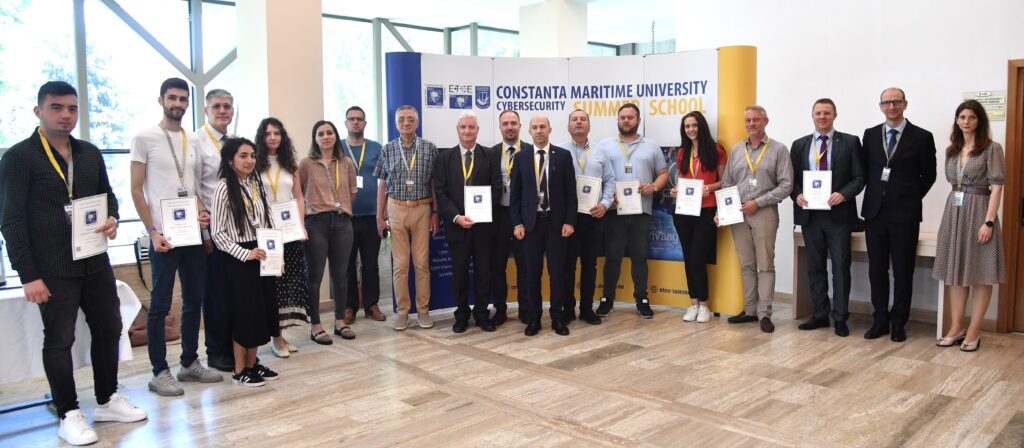
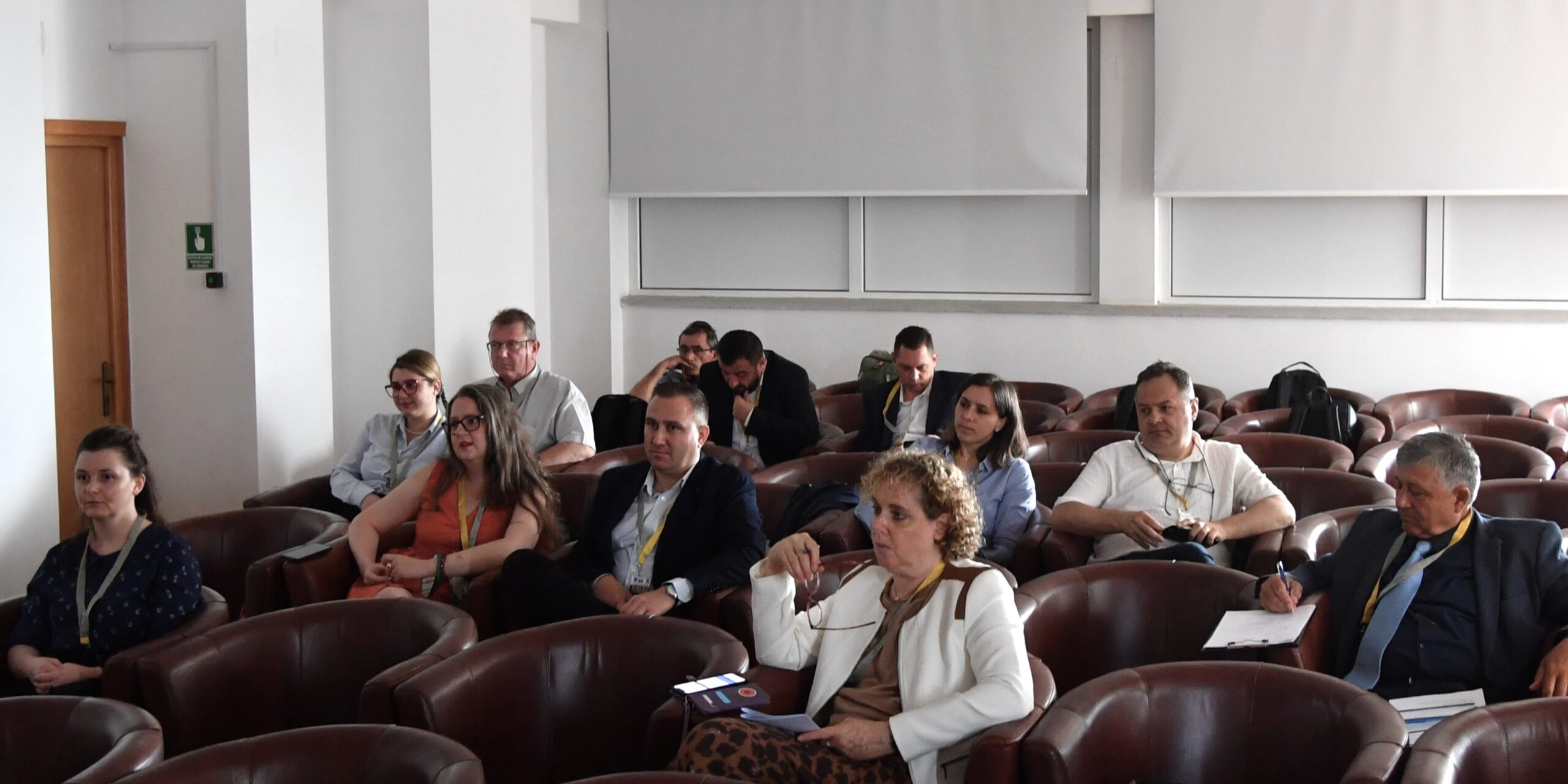
About the Organisers
The Maritime Cybersecurity Centre of Excellence is a leading provider of cybersecurity services and solutions for the maritime industry. MARCYSCOE mission is to enhance the cybersecurity resilience of the maritime sector through innovative research, expert advice, training, and education. MARCYSCOE provides a wide range of cybersecurity services to public and private organisations in the maritime industry, including vulnerability assessments, penetration testing, incident response, and compliance assessments. MARCYSCOE experts bring together extensive experience and knowledge of the maritime industry and cybersecurity best practices.
They work closely with the university’s faculty and students to develop and deliver cutting-edge research and education programs that address the maritime sector’s complex cybersecurity challenges.
MARCYSCOE also collaborate with industry partners, governmental agencies, and other organisations to promote cybersecurity awareness, knowledge-sharing, and innovation in the maritime industry.
Join this conference and get a chance to meet us and join our team.
Trusted Hands Behind Us
Our Great Partners




Venue
The Summer School will be held in hybrid format at the Training Center of Constanta Maritime University.
Address: No. 2 Cuarțului Street, Constanta, Romania, 900504
